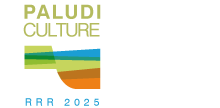The conference in brief
- RRR2025 - Renewable Resources from Wet and Rewetted Peatlands
4th International Conference on the Utilisation of Wetland Plants - Scope/objective of conference
The RRR2025 shows how peatland rewetting and innovative land-use concepts can be combined for an effective contribution to climate change mitigation. In sessions What are innovative examples for creating and strengthening regional value chains? What strategies can overcome barriers and challenges to enable a just transition to sustainable peatland use? - Date and place:
Tue 23rd – Thur 26th Sept 2025h,
Lecture hall at Campus Loefflerstraße, University of Greifswald - Profile:
RRR-Conference every four years at Greifswald starting from 2013 (in 2021 due to Corona online). It focusses on the climate friendly sustainable use of rewetted peatlands through paludicultures. The RRR is sporting an international profile with participants from all continents in past and this year’s conferences. An audience of 350 people from the fields of administration, economy, NGOs, politics, practice and science will be welcomed at the event. Over the years there is a strongly increasing demand for conference tickets and limited admission and waiting lists had to be introduced. - Target group:
Stakeholders involved in paludiculture, welcoming scientists, landowners and land users, administrators, businesses, artists, designers, policymakers, conservationists and all other interested people. - Keynote speakers:
Keynote speakers - Renewable Resources from Wet and Rewetted Peatlands - RRR 2025. - Programme
Condensed version:
Programme - Renewable Resources from Wet and Rewetted Peatlands - RRR 2025
Extended version:
RRR_Programm_Tabelle_Sessions.xlsx - Organisers:
The RRR2025 is jointly organised by the Greifswald Mire Centre and the Thuenen Institut. - Funding:
The conference is funded by the Deutsche Forschungsgemeinschaft (DFG). The RRR2025 conference is also supported by the projects PaludiZentrale , MOOSland and PaludiProgress funded the Federal Ministry of Agriculture, Food and Regional Identity (BMLEH) via the Fachagentur für nachwachsende Rohstoffe (FNR) as well as the project PaludiMV funded by Federal Ministry for the Environment, Climate Action, Nature Conservation and Nuclear Safety via Zukunft – Umwelt – Gesellschaft (ZUG) gGmbH.








